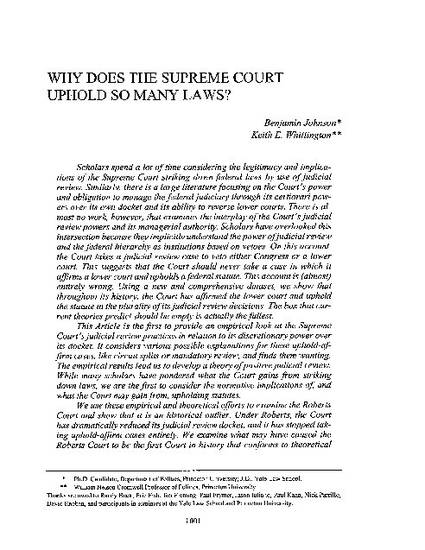
Article
Why Does the Supreme Court Uphold So Many Laws?
University of Illinois Law Review
(2018)
Abstract
Scholars spend a lot of time considering the legitimacy and implications of the Supreme Court striking down federal laws by use of judicial review. Similarly, there is a large literature focusing on the Court's power and obligation to manage the federal judiciary through its certiorari powers over its own docket and its ability to reverse lower courts. There is almost no work, however, that examines the interplay of the Court's judicial review powers and its managerial authority. Scholars have overlooked this intersection because they implicitly understand the power of judicial review and the federal hierarchy as institutions based on vetoes. On this account, the Court takes a judicial review case to veto either Congress or a lower court. This suggests that the Court should never take a case in which it affirms a lower court and upholds a federal statute. This account is (almost) entirely wrong. Using a new and comprehensive dataset, we show that throughout its history, the Court has affirmed the lower court and upheld the statute in the plurality of its judicial review decisions. The box that current theories predict should be empty is actually the fullest.
This Article is the first to provide an empirical look at the Supreme Court's judicial review practices in relation to its discretionary power over its docket. It considers various possible explanations for these uphold-affirm cases, like circuit splits or mandatory review, and finds them wanting. The empirical results lead us to develop a theory of positive judicial review. While many scholars have pondered what the Court gains from striking down laws, we are the first to consider the normative implications of, and what the Court may gain from, upholding statutes.
We use these empirical and theoretical efforts to examine the Roberts Court and show that this is an historical outlier. Under Roberts, the Court has dramatically reduced its judicial review docket, and it has stopped taking uphold-affirm cases entirely. We examine what may have caused the Roberts Court to be the first Court in history that conforms to theoretical expectations and use these insights to predict how the Court may behave in the future.
Publication Date
2018
Citation Information
Benjamin B. Johnson and Keith E. Whittington. "Why Does the Supreme Court Uphold So Many Laws?" University of Illinois Law Review Vol. 2018 (2018) p. 1001 Available at: http://works.bepress.com/benjamin-johnson/2/
